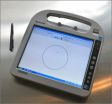(Press-News.org) VIDEO:
This video (S3 in the paper) shows the transport defect of the serotonin receptor in a KIF13A knock out neuron compared with a wild type neuron.
Click here for more information.
When motors break down, getting where you want to go becomes a struggle. Problems arise in much the same way for critical brain receptors when the molecular motors they depend on fail to operate. Now, researchers reporting in Cell Reports, a Cell Press publication, on February 7, have shown these broken motors induce stress and anxiety in mice. The discovery may point the way to new kinds of drugs to treat anxiety and other disorders.
The study in mice focuses on one motor in particular, known as KIF13A, which, according to the new evidence, is responsible for ferrying serotonin receptors. Without proper transportation, those receptors fail to reach the surface of neurons and, as a result, animals show signs of heightened anxiety.
In addition to their implications for understanding anxiety, the findings also suggest that defective molecular motors may be a more common and underappreciated cause of disease.
"Most proteins are transported in vesicles or as protein complexes by molecular motors," said Nobutaka Hirokawa of the University of Tokyo. "As shown in this study, defective motors could cause many diseases."
Scientists know that serotonin and serotonin receptors are involved in anxiety, aggression, and mood. But not much is known about how those players get around within cells. When Hirokawa's team discovered KIF13A at high levels in the brain, they wondered what it did.
The researchers discovered that mice lacking KIF13A show greater anxiety in both open-field and maze tests and suggest that this anxious behavior may stem from an underlying loss of serotonin receptor transport, which leads to a lower level of expression of those receptors in critical parts of the brain.
"Collectively, our results suggest a role for this molecular motor in anxiety control," the researchers wrote. Hirokawa says the search should now be on for anti-anxiety drug candidates aimed at restoring the brain's serotonin receptor transport service.
###
Cell Reports, Zhou et al.: "A Molecular Motor, KIF13A, Controls Anxiety by Transporting the Serotonin type 1a Receptor."
END
CORVALLIS, Ore. – The mystery of how salmon navigate across thousands of miles of open ocean to locate their river of origin before journeying upstream to spawn has intrigued biologists for decades, and now a new study may offer a clue to the fishes' homing strategy.
In the study, scientists examined 56 years of fisheries data documenting the return of sockeye salmon to the Fraser River in British Columbia – and the route they chose around Vancouver Island showed a correlation with changes in the intensity of the geomagnetic field.
Results of the study, which was supported ...
STANFORD, Calif. — It's established dogma that the immune system develops a "memory" of a microbial pathogen, with a correspondingly enhanced readiness to combat that microbe, only upon exposure to it — or to its components though a vaccine. But a discovery by Stanford University School of Medicine researchers casts doubt on that dogma.
In a path-breaking study to be published online Feb. 7 in Immunity, the investigators found that over the course of our lives, CD4 cells — key players circulating in blood and lymph whose ability to kick-start the immune response to viral, ...
A study out today in the journal Cell Stem Cell shows that human brain cells created by reprogramming skin cells are highly effective in treating myelin disorders, a family of diseases that includes multiple sclerosis and rare childhood disorders called pediatric leukodystrophies.
The study is the first successful attempt to employ human induced pluripotent stem cells (hiPSC) to produce a population of cells that are critical to neural signaling in the brain. In this instance, the researchers utilized cells crafted from human skin and transplanted them into animal models ...
COLUMBUS, Ohio – New research suggests that zinc helps control infections by gently tapping the brakes on the immune response in a way that prevents out-of-control inflammation that can be damaging and even deadly.
Scientists determined in human cell culture and animal studies that a protein lures zinc into key cells that are first-responders against infection. The zinc then interacts with a process that is vital to the fight against infection and by doing so helps balance the immune response.
This study revealed for the first time that zinc homes in on this pathway ...
A study at the University of Liverpool into the spread of sexually transmitted infection in ladybirds has shown that disease risk to large populations cannot be predicted without a full understanding of the disease dynamics at small geographical scale.
Scientists investigated a virulent form of infection in the central and northern European populations of the two-spot ladybird to understand the conditions that favoured disease spread. Researchers found that disease burden in two locations of the same habitat – the lime tree - were very different, despite being within ...
Boston, MA, Feb. 7, 2013 – Doctors routinely track their patients' hand-eye coordination to monitor any neuromuscular deficits, particularly as patients age or when they are injured -- but the tests they have been using to track this kind of information may be subjective and qualitative.
Researchers at the Wyss Institute for Biologically Inspired Engineering at Harvard University, the Beth Israel Deaconess Medical Center, and Hebrew SeniorLife, Boston (BIDMC), recently completed the first clinical study of a new rapid neuroassessment device they developed to quantitatively ...
DALLAS – Feb. 7, 2013 – UT Southwestern Medical Center scientists have synthesized a peptide that shows potential for pharmaceutical development into agents for treating infections, neurodegenerative disorders, and cancer through an ability to induce a cell-recycling process called autophagy.
Autophagy is a fundamental recycling process in which intracellular enzymes digest unneeded and broken parts of the cell into their individual building blocks, which are then reassembled into new parts. The role of autophagy is crucial both in keeping cells healthy and in enabling ...
JUPITER, FL, February 7, 2013 – Using two different compounds they developed, scientists from the Florida campus of The Scripps Research Institute (TSRI) have been able to show in animal models that inhibiting a specific enzyme protects heart cells and surrounding tissue against serious damage from heart attacks. The compounds also protect against additional injury from restored blood flow after an attack, a process known as reperfusion.
The study, which was led by Philip LoGrasso, a professor and senior scientific director of discovery biology at Scripps Florida, appears ...
EAST LANSING, Mich. — The stark contrast between America's "me-first" culture and the "collective-good" mentality in China is reflected in the two countries' use of social networking sites, according to a new study led by a Michigan State University scholar.
U.S. citizens spend more time on the networking sites, consider them to be more important and have more "friends" on the sites, the research found. The most popular social networking site in the United States is Facebook; in China it's Ozone.
Linda Jackson, MSU professor of psychology, said Chinese citizens tend ...
In time for Valentine's Day, Personality and Social Psychology Bulletin is featuring several new studies all about relationships – including the link between income in marriage and health, the role of jealousy in becoming a parent, and how humor affects romantic couples in conflict.
Being the breadwinner has health costs
Men whose wives earn more income are more likely to use erectile dysfunction medication than those who outearn their wives, even when the inequality is small, according to a new study. Researchers looking at more than 200,000 married couples in Denmark ...


